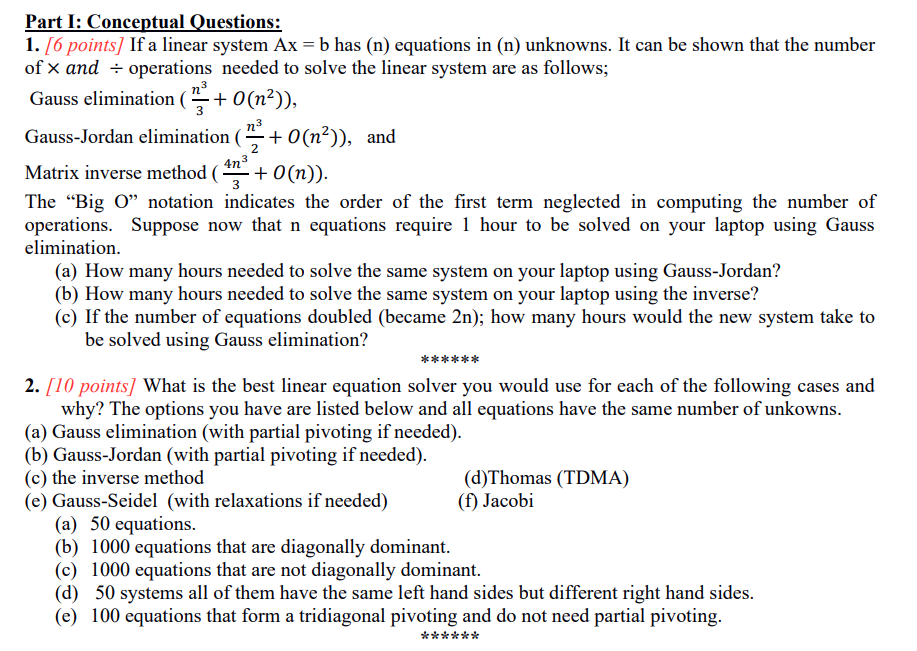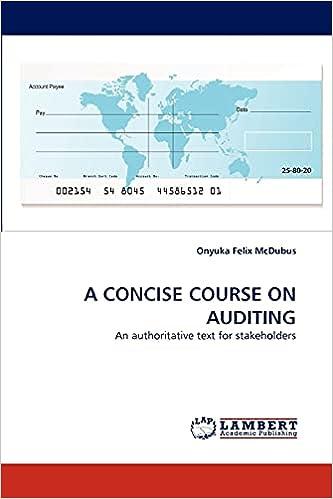
Part I: Conceptual Questions: 1. [6 points] If a linear system Ax=b has (n) equations in (n) unknowns. It can be shown that the number of and operations needed to solve the linear system are as follows; Gauss elimination (3n3+O(n2)), Gauss-Jordan elimination (2n3+O(n2)), and Matrix inverse method (34n3+O(n)). The "Big O" notation indicates the order of the first term neglected in computing the number of operations. Suppose now that n equations require 1 hour to be solved on your laptop using Gauss elimination. (a) How many hours needed to solve the same system on your laptop using Gauss-Jordan? (b) How many hours needed to solve the same system on your laptop using the inverse? (c) If the number of equations doubled (became 2n ); how many hours would the new system take to be solved using Gauss elimination? 2. [10 points] What is the best linear equation solver you would use for each of the following cases and why? The options you have are listed below and all equations have the same number of unkowns. (a) Gauss elimination (with partial pivoting if needed). (b) Gauss-Jordan (with partial pivoting if needed). (c) the inverse method (d)Thomas (TDMA) (e) Gauss-Seidel (with relaxations if needed) (f) Jacobi (a) 50 equations. (b) 1000 equations that are diagonally dominant. (c) 1000 equations that are not diagonally dominant. (d) 50 systems all of them have the same left hand sides but different right hand sides. (e) 100 equations that form a tridiagonal pivoting and do not need partial pivoting. Part I: Conceptual Questions: 1. [6 points] If a linear system Ax=b has (n) equations in (n) unknowns. It can be shown that the number of and operations needed to solve the linear system are as follows; Gauss elimination (3n3+O(n2)), Gauss-Jordan elimination (2n3+O(n2)), and Matrix inverse method (34n3+O(n)). The "Big O" notation indicates the order of the first term neglected in computing the number of operations. Suppose now that n equations require 1 hour to be solved on your laptop using Gauss elimination. (a) How many hours needed to solve the same system on your laptop using Gauss-Jordan? (b) How many hours needed to solve the same system on your laptop using the inverse? (c) If the number of equations doubled (became 2n ); how many hours would the new system take to be solved using Gauss elimination? 2. [10 points] What is the best linear equation solver you would use for each of the following cases and why? The options you have are listed below and all equations have the same number of unkowns. (a) Gauss elimination (with partial pivoting if needed). (b) Gauss-Jordan (with partial pivoting if needed). (c) the inverse method (d)Thomas (TDMA) (e) Gauss-Seidel (with relaxations if needed) (f) Jacobi (a) 50 equations. (b) 1000 equations that are diagonally dominant. (c) 1000 equations that are not diagonally dominant. (d) 50 systems all of them have the same left hand sides but different right hand sides. (e) 100 equations that form a tridiagonal pivoting and do not need partial pivoting







